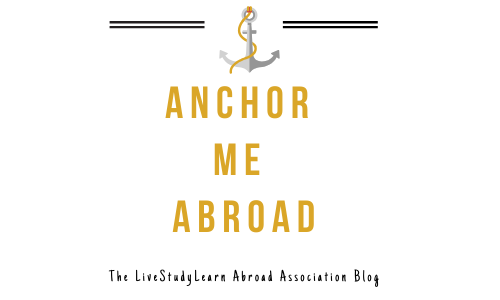
Are Study Abroad Programs Hard To Get Into? Learn how to increase your admissions prospects now!
As a high school, college, or graduate student thinking about study abroad, there are so many factors to consider when beginning your search. Among them, the question of competitiveness always arises. So let’s explore: Are study abroad programs really that hard to get into?

In order to understand the difficulty level of entry into a study abroad program, we must begin by clarifying what a study abroad program is and the common types of programs available.
What is Study Abroad?
Study abroad in its textbook form is a defined period of time where a current high school or collegiate student completes academic courses (credited or non-credited) in a country in which they were not born.

The fun definition is that study abroad is an educational excursion, an adventure in a new land, the chance to stretch your mind beyond its current concepts of “what is normal”, a resume builder, and a vacation all in one.
While it is important to remember you are traveling to study, so many memories I have from my six years of study abroad come from the people I met, the places I saw, and the memories I made outside of the classroom.
Common Types of Study Abroad Programs
As you’ve started your search on study abroad or semester away experiences, I’m sure you have come across a variety of program types and might be slightly confused about these differences.
There are three common types of study abroad programs:
1. Institutionalized Education Study Abroad Programs (Often referred to as Faculty-Led)
2. Independent Organized Study Abroad Programs
3. Self-appointed Study Abroad Programs
Institutionalized Education Study Abroad Programs – These are programs that are hosted and managed by the college or university you are currently enrolled in. They are usually incorporated into any degree program and typically last for one semester, and you can often apply scholarships and financial aid funding to cover your costs.
Independent Organized Study Abroad Programs – Independent organized study abroad programs are those which are offered by organizations that specialize in study abroad experiences and international enrichment opportunities, at the for-profit or nonprofit level.
You may or may not be eligible for the full earning of semester credits for these programs and any scholarships or grants you receive from your current university would likely not be applied to funding, however, student loans are always an option. On a cost-basis, they may often be slightly more expensive than IE programs.
Self-appointed Study Abroad Programs – These are “programs” officially, or unofficially, that are independent in nature. This encompasses a student’s choice to go abroad for a full degree program, internship, or other opportunities on their own ambition. The majority of the leg work, including securing a visa, finding housing, etc, is solely on the student and their family. Funding available will depend on the degree program you choose as well.

In my popular free e-Guide Finding Your Perfect Study Abroad Program, I cover each of these program types more extensively.
DOWNLOAD THE FREE eGUIDE
Admission into a Study Abroad Program

Your acceptance into any study abroad program will be contingent on a few factors regardless of which type you choose:
Enrollment Status
GPA
Admissions Essay/Statement
Full-Time Enrollment Students Often Receive Preference
Relevant to college & university students more than high schoolers who are likely all enrolled full-time, in many instances, collegiates who are enrolled in 12 credit units or more at the time of their application submission are provided preference over part-time students.

The primary reason for this is that most mainstream study abroad programs, especially those that would be completed for credit are a full-time commitment.
Grade Point Average (GPA) or Qualifications for Honors
While study abroad is a ‘whole person’ experience where you will get the chance to meet new people, see a different culture, travel, and build a global pathway, the primary reason for attending is to study while abroad.
For this reason, most programs place a higher weight on Grade Point Averages (GPAs) and select students who are likely to be able to keep up with the rigorous courses abroad.
There is also a misconception that study abroad classes are “easier”. In some ways, they are often harder as you will need to adapt to a new learning model, may have a language barrier in some of your required courses, and may or may not be graded similarly to your home college or university.
Admissions Essay/Statement
Similar to a justification for why you were seeking admissions to your college or university, you will need to make the case for why acceptance into a study abroad program is valuable and why you would be a great fit.
The weight of this statement in the admissions process varies by individual program, however, it can often be a deciding factor in admitting a candidate that may be weaker in other areas (including having a lower GPA) if they can show tenacity, grit, and effort to succeed compared to traditional candidates in their personal statement.
Additional Admissions factors into programs may include:
Students that come from underrepresented groups (this may include gender, race, or nationality-based on the program)
Students with lower GPAs that may be stronger in other areas
Lineage connection to location where you want to study abroad
So, are study abroad programs really that hard to get into?
Study abroad programs are not hard to get into if you can find a way to artfully pair your current academic status with your future goals. They are much easier to get into than college or university itself, but there may still be hurdles if you only focus on the “fun” side of study abroad.
In order to ensure your acceptance into one, two, or maybe three programs abroad, I would encourage you to cast the net very wide. Perhaps a program connected to your school will be cheaper, but will not fit as well into your academic plans long-term. Or you would prefer to complete an internship instead of just studying (been there!). There is no one-size-fits-all option to study abroad and there are many ways to see the world.
Four Actionable Steps For You to take NOW:

1. Schedule a meeting with your on-campus advisor or study abroad office to discuss what your school offers for study abroad students, how credits are applied for these programs, and when the deadlines are to apply.
2. If you are on a scholarship or financial aid, also schedule a meeting with the financial aid office on your campus to find out more about available funding for study abroad students.
3. Explore Organized Independent programs offered by AIFS, CEA, CIEE, and others.
4.Learn more about and consider registering for personalized study abroad advising.
I cannot wait to hear about what direction you decide to go in.
Until next time…

Known as The Study Abroad Specialist, Kimber Grayson is a serial-study abroader turned International Education coach and expert. Since 2014, she has helped 100+ students navigate their semester away journey from the coastal areas of Spain to China and every place in between. In 2018, she launched The LiveStudyLearn™ Abroad Association, a one-of-a-kind online membership platform for study abroad students worldwide.
She holds two Master's degrees from two well-respected London-based universities and has experience working in the US, UK & and Italy.
In her spare time (what's that again?), she enjoys leisure travel city breaks, any snow-based activity, skeet shooting, and attempting to learn new languages.
- kimberhttps://www.anchormeabroad.com/author/kimber/
- kimberhttps://www.anchormeabroad.com/author/kimber/
- kimberhttps://www.anchormeabroad.com/author/kimber/
- kimberhttps://www.anchormeabroad.com/author/kimber/
kimber
Known as The Study Abroad Specialist, Kimber Grayson is a serial-study abroader turned International Education coach and expert. Since 2014, she has helped 100+ students navigate their semester away journey from the coastal areas of Spain to China and every place in between. In 2018, she launched The LiveStudyLearn™ Abroad Association, a one-of-a-kind online membership platform for study abroad students worldwide. She holds two Master's degrees from two well-respected London-based universities and has experience working in the US, UK & and Italy. In her spare time (what's that again?), she enjoys leisure travel city breaks, any snow-based activity, skeet shooting, and attempting to learn new languages.


You May Also Like

Study Abroad in a Post-COVID World: What Will It Look Like?
August 22, 2021
Study Abroad vs. Study Away? How to Choose One
May 29, 2022














